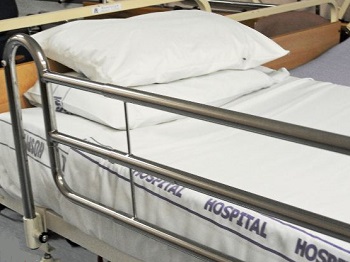NEC Indonesia plans to implement this new tech in select medical centers to improve sustainability and care.
NEC Indonesia, an IT and communications solutions and products firm, has now announced that it will be implementing a new form of mobile technology solution into select hospitals throughout the country.
This implementation of mobile tech will be a major component of its “Solutions for Society” project.
Among the IT solutions to be implemented as a part of this mobile technology program, will be its Bedside Nursing (BSN). The goal of the Solutions for Society project, as a whole, is to generate value in order to enhance the security and sustainability of Indonesian society. This particular component is designed to help to overcome the challenge of providing efficient, safe and yet affordable healthcare, which is a rising struggle for many organizations worldwide.
The proper use of mobile technology may help hospitals to be able to overcome some of those struggles.
 The primary challenge faced by nearly every hospital on the planet is in being able to meet a broad spectrum of needs of a patient population that is growing in its diversity. BSN has been created as an innovative IT solution that will ease the burden of those challenges through efficient resolutions.
The primary challenge faced by nearly every hospital on the planet is in being able to meet a broad spectrum of needs of a patient population that is growing in its diversity. BSN has been created as an innovative IT solution that will ease the burden of those challenges through efficient resolutions.
In order to use, BSN, nurses are equipped with mobile devices, such as tablets, in order to be able to obtain patient data on a real-time basis, and then make a request for information from the Hospital Information System (HIS). In this way, the nurses are better able to offer effective and personalized care to each patient.
The BSN system from NEC Indonesia is scalable on Android based mobile devices. It is meant to be user friendly and convenient, as well as compatible with the HIS platform. Upon the initial launch of this solution, it will be implemented in two of Indonesia’s major medical centers, including: Cimacan Public Hospital and Budh Asih Public hospital.
Through the use of this mobile technology, the result is supposed to be a reduced operational cost, while decreasing the risk of medical administrative errors and simultaneously improving patient care.
These wearable technology gadgets are highly popular but may also be used for legal purposes.
Consumers who purchase and use fitness trackers for the purposes of monitoring their health and activity levels may be surprised to discover that those same devices could actually be used against them in a court of law.
This type of wearable technology can monitor a lot about a person, providing useful legal evidence.
Various types of fitness trackers have been flying off the shelves, from Fitbits to Jawbones and smartwatches. They are used to track your steps and calorie burning, as well as your heart rate and sleep, in some cases. However, in a court of law, this can also provide a considerable amount of information to help to determine what the wearer was doing at the time of an incident. According to Bruce Hagen, an attorney from Atlanta whose firm has a specialty in bicycle accident cases, “This is the same as the black box data you would get on a car or a truck or an airplane.” Hagen has been requesting fitness data from his clients for a year.
The fitness trackers help to show how active a person was before an incident occurred.
 While the wearable technology was being used to track the wearer’s activity, it can actually provide a record of that individual’s life. Some situations allow the data to be used to reveal how active a person had been, on average, before an accident, and how that trend changed following a crash. This type of data can help to provide evidence with regards to a person’s honesty about the impact an accident has had on their lives or “it can also catch them in a lie if it comes to that,” explained Hagen.
While the wearable technology was being used to track the wearer’s activity, it can actually provide a record of that individual’s life. Some situations allow the data to be used to reveal how active a person had been, on average, before an accident, and how that trend changed following a crash. This type of data can help to provide evidence with regards to a person’s honesty about the impact an accident has had on their lives or “it can also catch them in a lie if it comes to that,” explained Hagen.
The first time this type of evidence from wearables was ever used was from a case in rural Pennsylvania. As it turned out, the law enforcement officers from the case were the ones who thought of accessing the data from the wearable technology.
The case involved a 911 call in which a Florida woman reported a sexual assault by an unknown intruder while she had been staying at her boss’s home. For a number of reasons, Detective Chris Jones started to doubt the woman’s case as he conducted his investigation. He then realized that she had a Fitbit, and he requested her login and password in order to access the information stored within her tracking account.
The fitness tracker data showed that the wearer had taken around 1,000 steps between the time she claimed to have gone to bed and the time and phoning the police. This evidence held up in court, revealing that she had been taking the steps as she staged the crime scene.
 The primary challenge faced by nearly every hospital on the planet is in being able to meet a broad spectrum of needs of a patient population that is growing in its diversity. BSN has been created as an innovative IT solution that will ease the burden of those challenges through efficient resolutions.
The primary challenge faced by nearly every hospital on the planet is in being able to meet a broad spectrum of needs of a patient population that is growing in its diversity. BSN has been created as an innovative IT solution that will ease the burden of those challenges through efficient resolutions.
